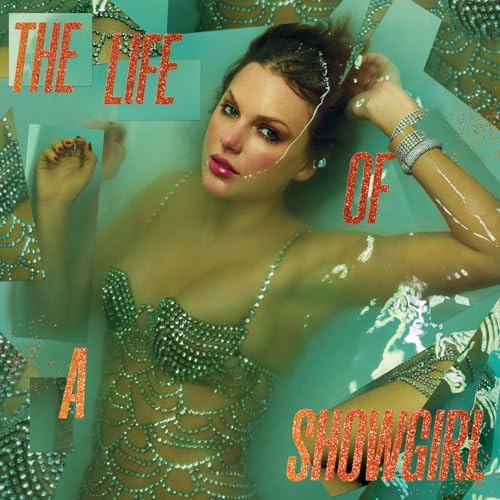
Taylor Swift released her 12th album, “The Life of a Showgirl” on Oct. 3. The album is strictly a pop record, featuring notable names in the genre like Sabrina Carpenter and the return of Swedish producers Max Martin and Shellback.
Although there was tremendous excitement over Swift returning to her pop roots, many fans have mixed feelings about the final product. Some praise the album for the quirky, care-free songwriting, while others argue over the lack of substance in contrast to Swift’s lyrical depth in previous works, including 2014’s “1989” and 2022’s “Midnights.”
Swift announced the new album during a podcast episode of “New Heights” alongside her fiancé Travis Kelce and future brother-in-law Jason Kelce on Aug. 13 after being on hiatus following the release of her previous album, “THE TORTURED POET’S DEPARTMENT” and the second leg of “The Era’s Tour.”
The opening track, “The Fate of Ophelia,” is a love letter to Kelce. The track starts slowly in the opening verse and then erupts into pop madness during the chorus. In the frequent referencing to Ophelia from Shakespeare’s play “Hamlet,” Swift characterizes her heartbroken life before Kelce appeared to rescue her love, unlike the female lead in the show. In the next track, “Elizabeth Taylor,” Swift parallels her struggles to the Hollywood actress of the same name. The chorus is the highlight of the track; the sudden intensity and angst represent Swift’s confirmation that she’s discovered her true love–a twist on the love life of the actress who was married eight times to seven different men.
“The Life of a Showgirl” has established Kelce as Swift’s romantic muse, as he is referenced in multiple other tracks across the album, such as “Opalite” and “Wi$h Li$t.” “Opalite” is named after Kelce’s birthstone and is centered around creating a new sense of joy. The lyrics are contagiously happy, with a beat that sparks infectious singing and dancing. In “Wi$h Li$t,” Swift pulls back the curtain on her life in the spotlight to reveal what she truly wants: a simple life to settle down with her true love. Unlike her previous love songs, the lyrics are not laced with anxiety alluding to Swift’s genuine happiness with Kelce.
When she isn’t singing about Kelce or her fame, Swift focuses on the betrayal and the scandals she’s faced throughout her career. In “Actually Romantic,” Swift allegedly disses pop singer Charli XCX, but she approaches the diss in a unique egotistical light with lyrics such as, “But it’s actually sweet / All the time you’ve spent on me / It’s honestly wild / All the effort you’ve put in.” Swift turns her harsh feelings into lust, showing that she holds clear grudges against those who have wronged her.
Track 4 “Father Figure,” an interpolation of George Michael’s 1987 song of the same name, allegedly targets Big Machine Records CEO Scott Borchetta. The song’s eerie storytelling describes the power-dynamic of a relationship between a protege and their mentor. Swift’s ability to be straightforward and fierce at the same time creates a powerful result, defining “Father Figure” as a leading track on the album.
The most devastating song on the album is “Ruin The Friendship.” The track is a continuation of her 2021 vault track, “Forever Winter” from Swift’s rerelease of her 2012 album, “Red”. Both tracks beautifully explore wistful moments in Swift’s life, exploring the possibilities of where she would be now if she had expressed her feelings in the past. “Ruin The Friendship” feels as if Swift is giving her listeners personal advice to take chances when the opportunity presents itself.
Unfortunately, “The Life of a Showgirl” is weakened by tracks like “CANCELLED!” and “Honey.” “CANCELLED!” attempts to be quirky, but winds up sounding cringy with lyrics such as “Did you girl-boss too close to the sun? / Did they catch you having far too much fun?” Even if such lyrics were intended sarcastically, the tone cannot prevent the content from falling short. “Honey” is a forgettable song, as the lyrics are dull and lack any form of depth. Although these tracks add nothing to the album, they do not invalidate the rest of the album’s composition.
The title track, “The Life of a Showgirl,” featuring Sabrina Carpenter, finishes off the album on a good note. Similar to Swift’s previous album closers, the song concentrates on the price of fame, but it ultimately thanks her fans for creating lovely memories across the years. Swift and Carpenter’s voices mix together pleasantly, creating a bittersweet farewell to the album.
Even if “The Life of a Showgirl” isn’t Swift’s strongest work lyrically, the album showcases Swift’s escape from a life controlled by misery to a new path fueled by happiness. Swift’s talent for storytelling and passion continue to show why she’s one of the leading artists of this generation.



